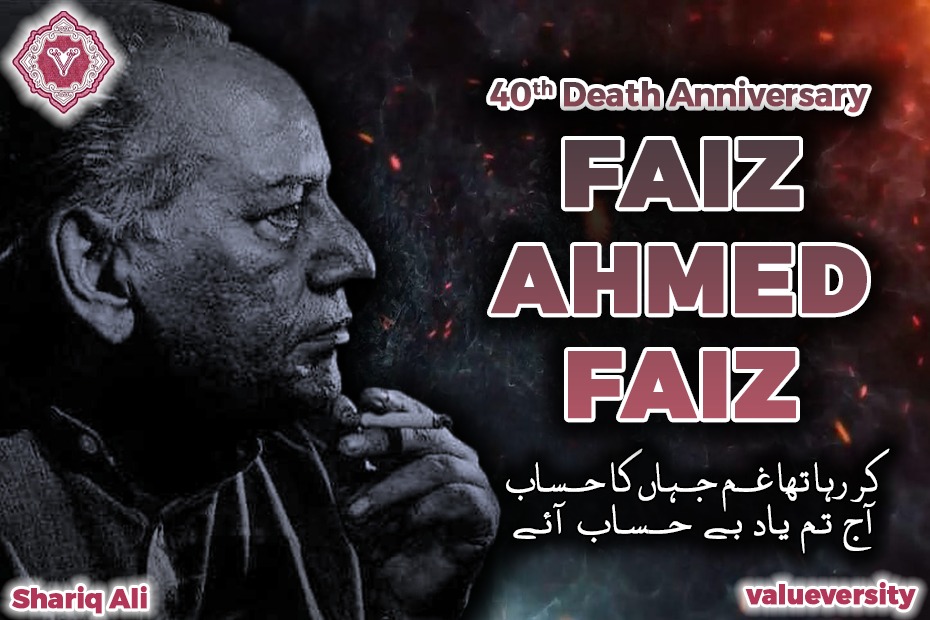40th Death Anniversary Faiz Ahmed Faiz
Excerpts from a Speech Delivered at the 40th Anniversary Memorial Event for Faiz Ahmed Faiz on November 20, 2024, at the Pakistan High Commission, London
Faiz Ahmed Faiz: Poet and Intellectual Guide
Dr. Shariq Ali Valueversity
Faiz Sahib has not only been the poetic voice of emotions and sentiments for my generation but also for many progressive youth across generations. Beyond his poetic brilliance, his stature as an intellectual guide remains unparalleled, serving as a beacon of enlightenment. Young individuals of my era not only learned from his poetry but also adopted his demeanor and political ideology as a model to emulate.
A Personal Tribute
This discussion and writing are not scholarly endeavors, nor do they aim to meet critical standards.
These reflections are a humble tribute from a student to Faiz Sahib and nothing more.
An Introduction to Faiz
Faiz was born on February 13, 1911, in Sialkot. After completing his early education there, he earned a Master’s degree in English Literature from Government College Lahore and another in Arabic from Oriental College Lahore. As a young man, he experienced the unemployment of the Great Depression, served in the army, and worked as a journalist.
Faiz was not just a literary giant but a dynamic figure in practical fields. He was a member of the Progressive Writers’ Association and editor of Pakistan Times. He also served as a teacher, trade unionist, and was incarcerated during the Rawalpindi Conspiracy Case. This imprisonment only deepened his Marxist beliefs and resolve.
Faiz’s multifaceted personality mirrored his poetry—a beautiful blend of love, struggle, and humanism.
Initially rooted in Urdu’s tradition of love and romance, Faiz’s poetry soon transitioned under the influence of Dr. Rasheed Jahan, Sajjad Zaheer, and other progressive friends. It became a voice for social justice, class struggle, and human rights. Poems like Bol Ke Lab Azaad Hain Tere and Hum Dekhenge not only became popular but also encapsulated his revolutionary ideals.
With collections such as Dast-e-Saba and Zindan Nama, Faiz introduced new horizons to Urdu literature.
Faiz and the Global Literary Scene
Faiz was actively involved on the international literary stage. His contributions were globally acknowledged, and in 1963, he was awarded the Lenin Peace Prize.
My Childhood and Faiz
My personal acquaintance with Faiz’s work began during my childhood through his book Dast-e-Saba. This marked the beginning of my journey of literary appreciation. At around 10 or 11 years of age, driven by my love for stories, I discovered this slender book on our family bookshelf one summer afternoon. Though I couldn’t fully grasp its meaning at the time, the lyrical quality of its poetry captivated me.
One poem, Mere Hamdam Mere Dost, became a favorite, and I often recited it to friends in my neighborhood.
Meeting Faiz
A couple of years later, I accompanied my elder brother to Karachi Airport as he departed for training in Moscow with Pakistan Steel Mills. At the airport, I saw a dignified man in a grey suit, smoking a cigarette with a calm demeanor. Someone whispered, “That’s Faiz Ahmed Faiz.” Witnessing him in person gave a tangible form to the admiration I already held for him, deepening my connection.
Student Life and Faiz
During my time at Dow Medical College, Faiz’s poetry and personality became a guiding force. His work inspired dreams of social justice and aesthetic appreciation, especially of the opposite gender’s beauty—a natural inclination of youth.
Sitting on the college steps with like-minded friends, singing Hum Dekhenge, was a profound experience.
His poetry was not just words but the embodiment of our emotions and aspirations.
Faiz and Global Literature
One of Faiz’s remarkable contributions was introducing Urdu literature to the global stage. He developed close relationships with internationally renowned poets like Pablo Neruda, Nazim Hikmet, and Mahmoud Darwish.
Faiz met Pablo Neruda in Moscow in 1962, where they exchanged thoughts on literature and politics.
His friendship with Nazim Hikmet blossomed as Faiz translated Hikmet’s poetry into Urdu and even dedicated a poem to him.
During his time in Beirut, Faiz strengthened his bond with Mahmoud Darwish, collaborating on the Palestinian cause. These relationships enriched Faiz’s poetry and expanded his ideological reach globally.
Faiz also edited Lotus Magazine, a progressive literary journal, connecting Urdu literature with global literary movements.
The Poetic Brilliance of Faiz
Faiz was not merely a poet but a school of thought. He seamlessly blended vision, contemplation, and emotions with artistic mastery. His ability to incorporate themes of social justice and revolutionary ideas into Urdu poetry without compromising its aesthetic beauty is unparalleled.
This unique blend of artistic excellence and purposeful content makes Faiz’s work impactful, gentle, and healing. Majrooh Sultanpuri aptly called him the Mir Taqi Mir of the Progressive Movement.
His profound understanding of English literature and Eastern traditions created a beautiful fusion in his work.
Conclusion
Ladies and gentlemen, I hope I have conveyed that Faiz is not just a treasure of Urdu literature but also a prominent voice in global resistance literature. His poetry continues to resonate with Urdu readers and, through translations, retains its influence on global literary horizons.
I view Faiz as more than a literary figure; he represents humanity’s universal struggles and ideals.
This great poet, whose words empowered voices against oppression and injustice, deserves our highest admiration.
